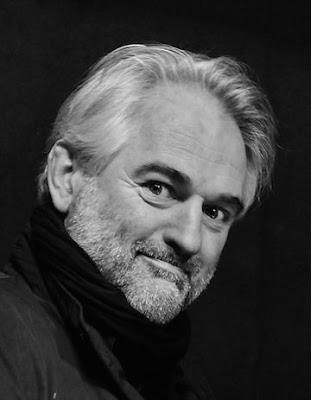conversations in ten questions: Michael Vogel (Familie Flöz)
[This interview was conducted by Ayşe Draz.]
What is the essence of theatre in your opinion?
Encounter, exchange and compassion! In a theatre that works without words and with masks, empathy is a basic prerequisite for the audience and also for the players. In this way, theatre can practice this valuable human gift and entertain at the same time. And when the audience leaves the theatre with a little more courage than they came, then it was good theatre.
Do you believe in the transformative power of art? How?
Yes! Reality is transformation! Theatre is a lot about how something affects us. The German word for reality (Wirklichkeit) is related to the word effect (Wirkung). Even if we believe in things and can touch something, the universe is made of effects, something always happens and transforms Theatre can play a concentrated role in this. An open and focused person can experience transformation in the theatre and that in return has an effect back on stage.
When you are working on a piece, what sources inspire you? Do dreams play a role in your pieces?
The biggest inspiration is and was the players. In conversations, interviews and improvisations we approach the characters and a theme. We develop the plays together and each individual naturally brings a lot of information into the process. What I dream during a development period for a play naturally also has an influence on the process.
When do you decide to give a title to a piece you are working on if it already does not have one?
Usually, it reveals itself very late in the process. Since we play on all continents, we usually try to find a title that somehow triggers associations everywhere. Sometimes it works.
Is there any artist or person whom you think influenced your art most? And if there is such an artist or a person, who?
Most influenced is hard to say, there are so many. Of course it's the silent movies and certainly the professors and lecturers at the Folkwang University of the Art, and that in all areas: theatre, dance and music. In addition, the 80s and 90s were an exciting time for theatre: Pina Bausch, Peter Brook, Jérome Deschamps, Ariane Mnouchkin, Simon McBurney... And I'm sure I've forgotten many now.
When you consider the current state of the world in every sense, what is the most important and urgent issue for you as an artist?
Humor and understanding. To enter into conversations and listen!
You are usually classified as ‘physical theatre makers’, could you tell us about the qualities of this sub-genre of theatre?
A play that we invent together can only be like the people who make it and it could only come into being in this way in this time. That makes it unique. We work with the body and Masks so that we can perform our plays anywhere in the world. We do theatre with masks and without words. I think it's ok if someone says physical theatre to it.
What are the challenges of working with masks on the stage?
The fundamental paradox of masks, of covering the living face with a rigid and limited form in order to create living figures, is both an attraction and a challenge. Suddenly a mask grins, looks angry, is astonished or even blushes with shame. Then the rigidity of the mask dissolves and becomes a great living force and a medium for immediate encounter.
How/why did you come up with the idea of working on a performance that circles around a ‘wedding’?
Theatre is a social art form because it is about encounter and exchange, always in its time. Because of the way we work, we find scenic material in improvisations that interests and excites us. The wedding came to us while we were dealing with the issue of “rich and poor”.
10. Is there anything particular you would like to tell the Istanbul audience?
MV
Honestly, we are always just very happy to receive feedback. Other then that, just enjoy the show!




Comments
Post a Comment